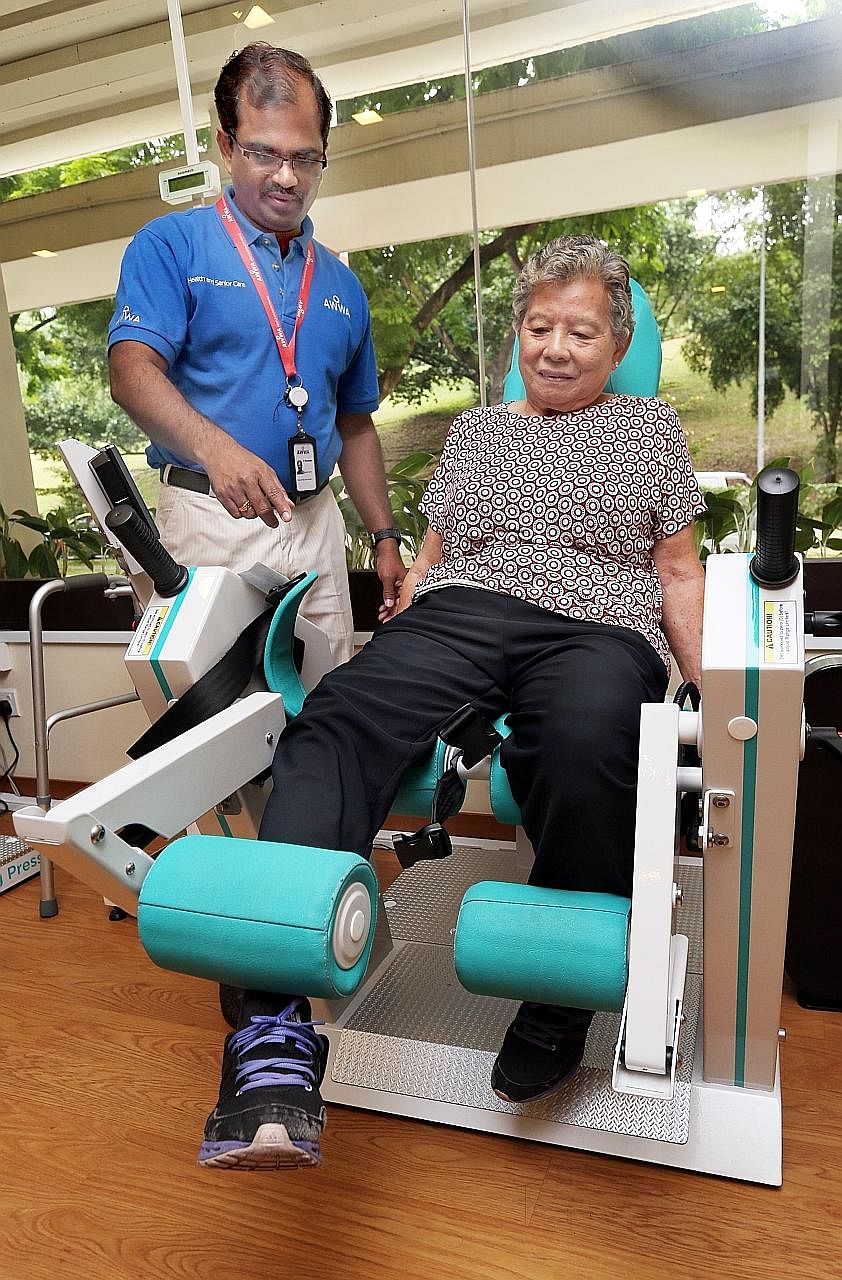When someone grows old and frail, many caregivers put them in blankets or on wheelchairs. Yet, new research suggests they might be better off working out in gyms.
After using special fitness equipment twice a week for at least three months, about 180 seniors from 13 eldercare facilities here were found to have better balance. They were able to stand up for longer periods and walk longer distances.
For example, the longest distance walked in the preceding seven days rose from 790m to 970m on average for those who live at home but use eldercare centres, and from 680m to 760m for those in a nursing home.
The improvement in leg muscle strength also meant they could better manage daily routines, such as eating and dressing, and with less supervision. The average age of the participants was 72.
"The results are rather significant in terms of improvement rates and when compared with other studies," said study researcher Magnus Bjorkgren, who heads the health science unit at Jyvaskyla University in Finland. "We now have some indications of people getting more independent."
He will present the findings at the second Singapore International Public Health Conference, which starts on Thursday.

The gym equipment used in the research is from Finland. Local philanthropic house Lien Foundation has committed $3.5 million to fund the bulk of the equipment and training costs for the therapists.
The machines use an air-pressure system that is gentler on muscles and joints. Weights can be increased in 100g steps instead of the usual 5kg in typical machines.
Smart cards ensure that equipment settings adjust automatically to the user, and a senior's performance on a machine is tracked by software, so physiotherapists can then tweak individualised regimens.
Around 1,000 seniors are already using the pneumatic gym machines in 16 nursing homes and eldercare centres. It is estimated that, by 2018, 4,500 seniors will have access to such machines.
Exercise therapist Andrew Yeo from Peacehaven nursing home said physical inactivity is a big problem among senior citizens.
"The frail are often caught in a vicious circle of inactivity," he said. "Afraid of falling, they don't exercise, and this makes them weaker, to the point of being bed-bound."
Physical inactivity is the fourth biggest factor contributing to deaths globally, according to the World Health Organisation.
In the early 1990s, Finland was one of the first countries to push for strength training for the elderly. Now, more than 90 per cent of its citizens aged 75 or above are able to live at home. Only 3 per cent live in long-term institutional centres.
Such gym programmes also help reduce healthcare costs as hip fractures from falls can result in costly medical bills, said Dr Bjorkgren.
-
Improving patients' quality of life
Terminally-ill patients at Assisi Hospice have been working out at a gym to improve their well-being and quality of life, as well as retain their dignity in the final stages of their lives.
They have been using exercise bikes, weights on pulleys and loose weights for their workouts since 2007.
Next month, they will get pneumatic gym equipment from the Lien Foundation initiative.
Assisi chief executive Choo Shiu Ling said: "The new equipment can be used by everyone, including those on wheelchairs and those who are very weak, as strength training can start at very low resistance, and both staff and patients do not need to deal with loose weights."
Lien Foundation hopes other groups of people - including psychiatric patients and those who are terminally ill - will also benefit from them.
Banyan Home, a residential facility for men who are destitute and mentally ill, received its new machines in July. Mr James Poon, its senior personal care officer, said: "We knew that if our residents did not have the physical fitness to perform daily activities or tasks independently, their quality of life is likely to suffer.
"We initially thought of installing a set of fitness equipment similar to those found in HDB estates, but those may cause injury to residents who are more frail, as they cannot be calibrated. The new machines came just in time and our residents are fascinated. "
Janice Tai
Every 32 minutes, an elderly person turns up at a public hospital emergency department because of an injury from a fall. Each month, about 100 seniors find themselves in hospital, staying a week or more because of such injuries, The Straits Times reported last year.
The number of hip fractures among people aged 50 or older treated at public hospitals rose from 1,900 in 2004 to 2,500 in 2014 - with half of them involving those aged 80 or older. According to research, strength and balance training can reduce falls by up to half.
Madam Ooi Sai Hiang, 73, once suffered knee pain whenever she stood up or walked. Because of the pain and other medical conditions, she had to give up pastimes such as bingo. The isolation and lifestyle changes made her depressed.
After she started working out twice a week in the special gym at AWWA Rehab and Day Care Centre in Ang Mo Kio in January, the pain in her knee went away. Tests done in June found she could walk up to 1.1km. She can now go to her nearby wet market or mall on her own.
"I was quite surprised and a bit frightened when the therapist asked me to use the gym equipment because it looks like it's made for bodybuilders or sportsmen, and I had not exercised in a gym before," she said.
"I thought there would be no cure for my knee pain, especially at this age. I am amazed as the pain had troubled me for a very long time."

